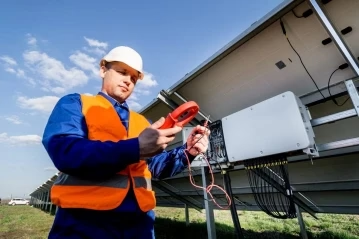
As the world moves towards sustainable energy solutions, solar energy has emerged as a popular choice for environmentally conscious consumers. If you are considering harnessing the power of the sun to generate electricity, you've probably come across terms like "solar battery" and "24V inverter." But what happens if you have a 12V battery and a 24V inverter? Can they work together? In this blog post, we will explore this common question to help you make an informed decision when purchasing solar energy-related products.
1. Understanding the Basics: Solar Battery and Inverter
Before we delve into the compatibility of a 24V inverter with a 12V battery, let's first understand the key components involved in a solar energy system.
A. Solar Battery
A solar battery is an essential component in a solar power system. Its primary function is to store the excess energy generated by solar panels during peak sunlight hours. This stored energy can be used later when sunlight is insufficient, such as during nighttime or on cloudy days. Solar batteries come in different voltages, and the most common ones are 12V, 24V, and 48V.
B. Inverter
An inverter, on the other hand, plays a crucial role in converting the direct current (DC) electricity produced by solar panels into alternating current (AC) electricity, which is what most household appliances and electronics use. Inverters are designed to match the voltage of the battery bank they are connected to, and they also come in various voltages, including 12V and 24V.
2. Can You Use a 24V Inverter on a 12V Battery?
Now, the big question: Can you use a 24V inverter on a 12V battery? The short answer is no, and here's why.
A 24V inverter is specifically designed to work with a 24V battery bank. Plugging a 24V inverter into a 12V battery can result in several issues:
A. Voltage Mismatch
The most significant concern with using a 24V inverter on a 12V battery is the voltage mismatch. Inverters are engineered to handle a specific input voltage, and using an inverter with a lower voltage battery will likely lead to malfunctions, reduced efficiency, or even permanent damage to the inverter.
B. Power Output Limitations
Even if you manage to get the 24V inverter to work with a 12V battery through modifications or adapters (which is not recommended), the power output will be severely limited. The inverter may not be able to supply the required wattage to run your appliances and devices effectively.
C. Safety Hazards
Attempting to force a 24V inverter to work with a 12V battery can create safety hazards. Electrical circuits might overload, resulting in potential short-circuits or fires. To ensure the safety of your solar energy system and your property, it is crucial to use compatible components.
3. Choosing the Right Inverter for Your Solar Battery
Now that we know a 24V inverter is not suitable for a 12V battery, what should you do if you have a 12V battery but still want to enjoy the benefits of solar energy in your home? Here are some steps you can take:
A. Select a Compatible Inverter
If you already have a 12V battery, make sure to choose a 12V inverter that matches your battery's voltage. Reputable solar energy product suppliers will offer inverters of various voltages to suit your specific needs.
B. Upgrade to a 24V Battery System
If you have your heart set on a 24V inverter, consider upgrading your battery system to a 24V configuration. While this may involve some additional investment, it can significantly enhance the performance of your solar power setup.
C. Seek Professional Guidance
When in doubt, always consult with a professional solar energy system installer or an expert from a reliable solar energy product company. They can assess your requirements and recommend the most suitable components for your specific setup, ensuring efficiency, safety, and a seamless experience.
Conclusion
In conclusion, using a 24V inverter on a 12V battery is not advisable due to voltage mismatch, power limitations, and safety hazards. For a successful solar energy system, it's essential to use components that are compatible with each other, ensuring optimal performance and longevity.
When purchasing solar energy-related products, always consider the voltage requirements of your solar battery and select an inverter accordingly. Seek advice from experts if you're unsure about the right setup for your needs. Embracing solar energy is a fantastic choice for a sustainable future, and with the right components, you can harness the power of the sun to power your home efficiently.
So, get ready to embrace solar energy and make a positive impact on the environment while enjoying the benefits of renewable energy. Happy solar power journey!

0 comments